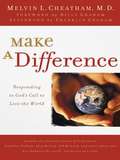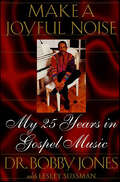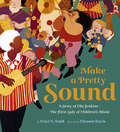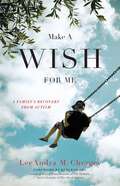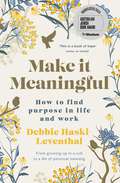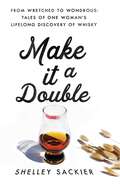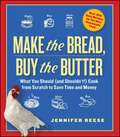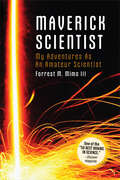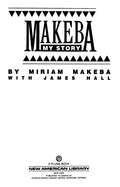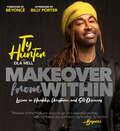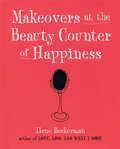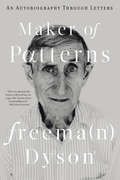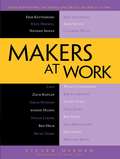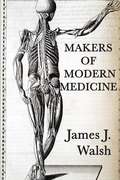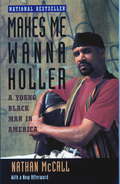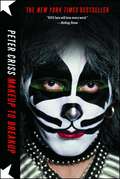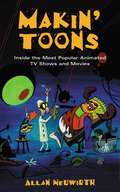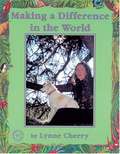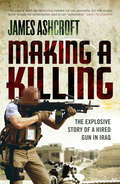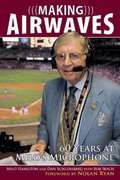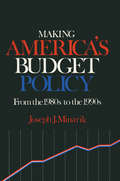- Table View
- List View
Make a Difference
by Melvin L. CheathamDr. Mel Cheatham, a successful neurosurgeon with a thriving private practice, found himself at the age of fifty feeling empty. He had it all. And yet he knew something was missing-the peace and joy that comes from showing God's love to others. Then one day he heard Franklin Graham speak about the desperate need for doctors in developing countries, and in that message, Mel heard God speaking directly to his heart. He gave up a private neurosurgery practice and devoted himself to full-time medical relief work and evangelism projects in developing and war-torn countries. Mel Cheatham found out what it means to Make a Difference. In Make a Difference, Mel shares the stories of dozens of people who have risked it all to gain what they cannot lose-people who learned to listen to God and respond to His call to love the world. You'll read about: Karen Daniels, a 31-year-old nurse from British Columbia who heard God calling her to minister through her medical skills in wartorn Sudan, where temperatures often reach 115 degrees and the only "bathrooms" are pit latrines dug in the ground. Marianne Morton, who donated a kidney to a neighbor she barely knew, a Jewish man who was being kept alive only through daily dialysis. Through these and many other stories, and through the use of Scripture, Melvin will help you listen to God's still, small voice, calling you to make a difference, to show His love to a world in need.
Make a Home Out of You: A Memoir
by Ginelle TestaFor readers of Drinking: A Love Story by Caroline Knapp comes an unflinching coming-of-age addiction memoir about one woman&’s journey to overcome her destructive roots to discover her road to recovery.Born to an abusive mother and a drug-dealer father, Ginelle Testa is not exactly set up for success—and her early years are just as troubled as one might expect. By the end of her thirteenth year, she&’s started experimenting with alcohol and drugs, has fallen prey to anorexia, and has been sexually assaulted. And that&’s only the beginning of her spiral down into addiction and disordered eating. As Ginelle progresses into young adulthood, she hits several substance-related bottoms. In her senior year of college, after blacking out and ending up naked in her dorm&’s community shower, she goes to Alcoholics Anonymous and gets sober. But steering clear of drugs and alcohol, she discovers, is not a cure-all—she still has a long way to go before she can truly heal. Raw, relatable, and powerful, Testa&’s is a riveting tale of climbing up from rock bottom—and learning to make a home in oneself instead of in substances and other people.
Make a Joyful Noise: My 25 Years in Gospel Music
by Bobby Jones Lesley SussmanDr. Bobby Jones, a leading figure in the gospel music industry, offers a revealing look at his career and friendships with other celebrities.Jones is the host and executive producer of the world's number one gospel television program with a viewership exceeding five million. He shares with readers his own personal journey from an impoverished childhood where his love of education and Christian music played a major role in his becoming a prominent award-winning leader in the gospel music world. Jones counts many of gospel's most beloved celebrities as his friends, including Aretha Franklin, Shirley Caesar, Kirk Franklin, the Winans, and Barbara Mandrell. His book provides intimate and inspirational details of these friendships.
Make a Pretty Sound: A Story of Ella Jenkins—The First Lady of Children's Music
by Traci N. ToddOnce upon a time, children's music was just Mother Goose, nursery songs, and lullabies. And then came Ella Jenkins.Ella Jenkins is an American folk singer and living legend dubbed "The First Lady of Children’s Music." For nearly 70 years, she has been writing and performing music that has entertained and engaged generations of young listeners. In Make a Pretty Sound, Ella’s life and legacy are captured in vibrant sights, sounds, and stories that leap right off the page. Born in St. Louis, Missouri, and raised in Chicago, Ella grew up loving music of all kinds—the call-and-response of Cab Calloway, the exciting rhythms of Moroccan and Indian records spun in a local record shop, the bluesy notes her uncle teased from his harmonica. She listened to music from around the world, and no matter what language it was in, she could feel what it meant—the bridge in understanding and feeling that music offers from one heart to another. When she began working with children, she knew just what to do. She knew music would offer children a kinetic learning experience that engaged them physically, verbally, and empathetically, creating community out of song. Soon, she was recording her own albums and became an international star. In these beautifully illustrated pages, Ella’s journey—from the gritty streets of Chicago to the classrooms where she found her calling to an opportunity to raise her voice for freedom alongside Martin Luther King, Jr., to the spotlight of the world’s stage—is rhythmically, joyfully, brilliantly illuminated. For readers familiar with Ella Jenkins or new to her work, this nonfiction picture book offers a treasury of inspiration that touches on American history, civil rights, cultural awareness, and the incredible power of music.A LIVING LEGEND: Drawing on personal interviews the author conducted with Ella and her manager, this is Ella’s story told in her own words. For all who have felt the impact of her work in children's programming, in classrooms, and in their homes, this is a wonderful opportunity to explore the legacy of an artist who offers children the gift of music and the gift of knowing that another human heart reaches out to theirs. LYRICAL TEXT AND ART: Rhythmic text and colorful illustrations celebrate the musicality of Ella's life and convey the singular joy that is found in the sharing of music! BEAUTIFUL GIFT BOOK: With extraordinary writing and beautiful art, this book makes a perfect present for any young reader who loves music, biographies, or both.Perfect for: Fans of Ella Jenkins Parents, teachers, and caregivers of children who love music Teachers and librarians looking for a great picture book biography Anyone interested in multicultural music for kids Readers who enjoy the Little People, BIG DREAMS and Who Is/Who Was biography series Gift givers looking for a children’s music book for birthday, holiday, or any celebratory occasion
Make a Wish for Me: A Family's Recovery from Autism
by LeeAndra ChergeyIndie Reader Discovery Awards Winner for Parenting National Indie Excellence Award Finalist Hollywood Book Festival 2016 Honorable mention in general non-fiction Bookvana 2016 Finalist in Parenting/Family Bronze Medal Winner Inspirational Memoir-Female Living Now Book Awards-Books for Better Living When LeeAndra Chergey is told that her son, Ryan, is no longer considered &“normal,&” she and her family are forced into a new way of handling the outside world. Together, Chergey&’s family and a team of carefully chosen therapists put in years of hard work, and eventually teach Ryan to speak and express emotions. Through it all, Chergey follows her heart—and in the process, she learns that being &“normal&” is not nearly as important as providing your child with a life full of joy, love, and acceptance. Tender and candid, Make A Wish For Me is a story of accepting and tackling a disability stigmatized and misunderstood by society.
Make it Meaningful: Finding Purpose in Life and Work
by Debbie Haski-LeventhalUnorthodox meets Start with Why: how escaping a cult led Debbie Haski-Leventhal to become a &‘professor of purpose&’ and master the art of finding personal meaning in life. When she was five, tragedy prompted her parents to join Kabbalah, a cult-like sect of Judaism. They immersed themselves in it unreservedly – from its peculiar rituals (rolling in the snow naked to purify their sins) to the beauty of belonging to something greater than themselves. She left at eighteen – after years of abuse and living in communes in three countries – devastated and isolated, searching for meaning in her life. Today, that woman is Professor Debbie Haski-Leventhal, who specialises in finding meaning in our personal and professional lives. In this book, Debbie shares her own and other people&’s stories to explore ideas of purpose, impact, values, and resilience. She sheds light on the &‘meaning&’ of meaningfulness, offers frameworks for meaningfulness in life, and suggests ways in which purpose can help make our lives and work more significant and valuable. In the age of &‘The Great Resignation&’, we&’re all trying to discover a more deliberate and rewarding shape to our own lives. Debbie Haski-Leventhal is the perfect companion for the journey.
Make it a Double: From Wretched to Wondrous: Tales of One Woman's Lifelong Discovery of Whisky
by Shelley SackierA witty and immersive look at the history, mythology, science, and magical touch that makes whisky taste like a drop of gold. Braving the &“all boys&” clubhouse of the world of whisky has not been easy, but Shelley Sackier has managed to do just that out of her love for the drink. By turns funny and poignant and filled with vivid insight into this ancient craft, Make it a Double will persuade even a teetotaler to want a wee dram. As a woman whose first sip of whisky created the female doppelganger of a Mr. Yuk sticker, that experience produced a sharp realization that the liquid was foul, poisonous, and needlessly dirtied a previously clean glass. And then she met Scotland. Her curiosity and growing passion lit a fire—igniting a desire to learn more about this craft&’s rich and vivid history and the need to break out of an old life and to become the mother, partner, and woman she has always sought to be. After completing a course in Scotland&’s famed Bruichladdich Distillery, Shelley begins her path of writing about—and working within—the world of whisky. There has never been a better time for Shelley's inimitable voice to shed light on this intoxicating realm. Women are not only impressively contributing to the burgeoning sales of the spirit—making up nearly 40% of the whiskey-drinking population in the United States—but they are also growing in number as they enter in to, train within, and lead the industry with their determined creativity and innovation. In the tradition of Blood, Bones, and Butter, Make it a Double establishes Shelley Sackier as a fresh new voice in the lush world of culinary narrative.
Make the Bread, Buy the Butter: What You Should and Shouldn't Cook from Scratch -- Over 120 Recipes for the Best Homemade Foods
by Jennifer ReeseWhen Jennifer Reese lost her job, she was overcome by an impulse common among the recently unemployed: to economize by doing for herself what she had previously paid for. She had never before considered making her own peanut butter and pita bread, let alone curing her own prosciutto or raising turkeys. And though it sounded logical that "doing it yourself" would cost less, she had her doubts. So Reese began a series of kitchen-related experiments, taking into account the competing demands of everyday contemporary American family life as she answers some timely questions: When is homemade better? Cheaper? Are backyard eggs a more ethical choice than store-bought? Will grinding and stuffing your own sausage ruin your week? Is it possible to make an edible maraschino cherry? Some of Reese's discoveries will surprise you: Although you should make your hot dog buns, guacamole, and yogurt, you should probably buy your hamburger buns, potato chips, and rice pudding. Tired? Buy your mayonnaise. Inspired? Make it. With its fresh voice and delightful humor, Make the Bread, Buy the Butter gives 120 recipes with eminently practical yet deliciously fun "Make or buy" recommendations. Reese is relentlessly entertaining as she relates her food and animal husbandry adventures, which amuse and perplex as well as nourish and sustain her family. Her tales include living with a backyard full of cheerful chickens, muttering ducks, and adorable baby goats; countertops laden with lacto-fermenting pickles; and closets full of mellowing cheeses. Here's the full picture of what is involved in a truly homemade life--with the good news that you shouldn't try to make everything yourself--and how to get the most out of your time in the kitchen.
Make: My Adventures as an Amateur Scientist
by Forrest M. MimsMaverick Scientist is the memoir of Forrest Mims, who forged a distinguished scientific career despite having no academic training in science. Named one of the "50 Best Brains in Science" by Discover magazine, Forrest shares what sparked his childhood curiosity and relates a lifetime of improbable, dramatic, and occasionally outright dangerous experiences in the world of science.At thirteen he invented a new method of rocket control. At seventeen he designed and built an analog computer that could translate Russian into English and that the Smithsonian collected as an example of an early hobby computer. While majoring in government at Texas A&M University, Forrest created a hand-held, radar-like device to help guide the blind. And during his military service, he had to be given special clearance to do top secret laser research at the Air Force Weapons Lab. Why? Because while he lacked the required engineering degree, they wanted his outside-the-box thinking on the project.He went on to co-found MITS, Inc., producer of the first commercially successful personal computer, wrote a series of electronics books for Radio Shack that sold more than seven million copies, and designed the music synthesizer circuit that became known as the infamous Atari Punk Console. All this came before he started consulting for NASA's Goddard Space Flight Center, and NOAA's famous Mauna Loa Observatory, and earning the prestigious Rolex Award.This intimate portrait of a self-made scientist shares a revelatory look inside the scientific community, and tells the story of a lifelong learner who stood by his convictions even when pressured by the establishment to get in line with conventional wisdom. With dozens of personal photos and illustrations, Maverick Scientist serves as proof that to be a scientist, you simply need to do science.
Makeba: My Story
by James A. HallThe renowned South African singer and political activist recounts her life--a life that encompasses the splendor of international acclaim, bitter personal tragedy, and political intrigue and violence
Makeover from Within: Lessons in Hardship, Acceptance, and Self-Discovery
by Ty HunterA moving and uniquely inspiring book of self-reflection and motivational musings from Ty Hunter, stylist to the stars.In this nuanced mix of memoir, photographs, motivational musings, and wisdom, legendary celebrity stylist Ty Hunter recounts both the trying times and brightest moments of his life. Faced with physical, mental, and emotional obstacles that range from a gunshot wound to caring for his sick parents to simply existing as a Black, gay man in America, Ty channeled his energy into surmounting the unconquerable, along the way developing a resilient spirit—one that begs to be shared with the world.In overcoming his own hardships and blossoming in his career as a stylist, where he worked with superstars like Beyoncé and Billy Porter, Ty has developed a knack for inspiring self-confidence in others. Perfect for the unstoppable badass in your life, this book tells the story of a vibrant soul who defeated the odds and whose goal is to guide you to a brighter and more positive future.DISTINGUISHED AUTHOR: Ty Hunter was Beyoncé's stylist for 18 years, currently works as Billy Porter's head stylist, and launched a fashion line with A Cloud. Ty's substantial following on Instagram, where he shares motivational life advice, demonstrates high demand for his words of wisdom. SUPERSTAR CONTRIBUTORS: Featuring a foreword by multi-platinum Grammy award–winning singer, songwriter, and actress Beyoncé and afterword by multi-award-winning actor, singer, and author Billy Porter. A GREAT READ AND GIFT: This gorgeous book is perfect for birthdays, holidays, Pride celebrations, or any other day that needs some positive energy. INSPIRING STORY: This book sends a bold and inspiring message to underdogs everywhere that they can overcome the impossible and thrive. Perfect for:Fans of Ty Hunter, Beyoncé, Tina Knowles, Billy Porter, and moreFashion and pop culture enthusiasts
Makeovers at the Beauty Counter of Happiness
by Ilene Beckerman"During my life, I've spent thousands of hours and thousands of dollars on my hair, my makeup, and my clothes, trying to look prettier because I grew up believing that pretty girls had happier lives." "I'd be a lot happier now if I had that time and that money back." Ilene Beckerman has lived long enough to have finally learned that there's more to happiness than finding the right hairdo and maintaining an ideal weight. This is never more clear than when she's invited to her fiftieth elementary-school reunion. "Of course I'd go to the reunion." Beckerman says. But delight soon turns to dismay: "I wondered who'd be there. How would they look? Would I look as good? What would I wear? Could I lose twenty pounds by June?" Her reunion presents the perfect occasion to illustrate the anxieties and doubts, the dreams and hard-earned triumphs, of women—from Queen Victoria to Britney Spears. Beckerman knows what really matters in life (besides good hair), and she imparts her wisdom in letters (unsent) to Madonna, Ava Gardner, Sofia Coppola, Meryl Streep, Gwyneth Paltrow, and others, and to her granddaughter Olivia. Frida Kahlo, Cinderella, Whistler's Mother, and Audrey Hepburn make appearances too. In this wise and wonderful book, she shares a lifetime of experience that reminds us that, ultimately, our mothers (and our grandmothers) were right: real beauty comes from within.
Maker of Patterns: An Autobiography Through Letters
by Freeman DysonBoth recalling his life story and recounting many of the major advances in twentieth-century science, a renowned physicist shares his autobiography through letters. While recognizing that quantum mechanics “demands serious attention,” Albert Einstein in 1926 admonished fellow physicist Max Born that the theory “does not bring us closer to the secrets of the Old One.” Aware that “there are deep mysteries that Nature intends to keep for herself,” Freeman Dyson, the 94-year-old theoretical physicist, has nonetheless chronicled the stories of those who were engaged in solving some of the most challenging quandaries of twentieth-century physics. Written between 1940 and the early 1980s, these letters to relatives form an historic account of modern science and its greatest players, including J. Robert Oppenheimer, Richard Feynman, Stephen Hawking, and Hans Bethe. Whether reflecting on the horrors of World War II, the moral dilemmas of nuclear development, the challenges of the space program, or the considerable demands of raising six children, Dyson offers a firsthand account of one of the greatest periods of scientific discovery of our modern age.
Makers at Work
by Steven OsbornWhat do you get when you combine an electronics hobbyist, hacker, garage mechanic, kitchen table inventor, tinkerer, and entrepreneur? A "maker," of course. Playful and creative, makers are--through expertise and experimentation--creating art, products, and processes that change the way we think and interact with the world. As you''ll see from the 21 interviews in Makers at Work, inquisitive makers are just as apt to pick up a laser cutter or an Arduino as a wrench to fashion something new. For example, you''ll meet Jeri Ellsworth, who might provide a video lecture on magnetic logic one day and a tutorial on welding a roll bar on a stock car the next. You''ll also meet Eben Upton, who put cheap, powerful computing in the hands of everyone with the Raspberry Π Becky Stern, who jazzes up clothing with sensors and LEDs; and bunnie Huang, who knows the ins and outs of the Shenzhen, China, electronics parts markets as well as anyone. As all the interviews in Makers at Work show, makers have something in common: reverence for our technical past coupled with an aversion to convention. If they can''t invent new processes or products, it''s simply not worth doing. Crazy as foxes, makers--working in the spirit of Tesla, Wozniak, Edison, Gates, Musk and many others--can bring sophisticated products to the people or to the market as fast or faster than large corporations. And they are not just enabling new technologies and devices--they are changing the way these devices are funded, manufactured, assembled, and delivered. Makers at Work puts a spotlight on the maker mindset and motivation of those who are reinventing the world one object or idea at a time. You will: Meet the individuals who define what it means to be a maker. Learn about the tools and technologies driving the new industrial revolution. Discover ways to scale your weekend project into a profitable business. See how others have used to crowdfunding to make their visions a reality. Learn how open-source hardware and software is enabling whole new categories of products by removing barriers of entry for inventors. The new masters of the "Makerverse" ask two questions: Can it be done? Is it fun? As these interviews will show, the answer to both questions is, "Let''s find out. " What you''ll learn You will: Learn about 3d printing and how it is changing manufacturing. Discover new software tools for designing things on your own. Learn how to source parts, code, or ideas for your creations. Meet maker pioneers who helped open up a new world, and makers who have used crowdfunding to support their efforts. Uncover recipes for success or failure when bringing physical products to market. Learn ways to scale your weekend project into a profitable business from experienced entrepreneurs. Learn how open-source hardware and software is enabling new classes of products by removing the barrier of entry for inventors. Open your mind to new ideas, methods, things, and possibilities. Who this book is for This book is for anyone with an independent spirit, creative bent, or natural curiosity who believes you can create whatever your mind can conceive and wants to see how others have done just that. Table of Contents Erik Kettenburg, Founder, Digistump David Merrill, Cofounder, Sifteo Nathan Seidle, CEO, SparkFun Electronics Laen, Founder, OSH Park Zach Kaplan, Founder and CEO, Inventables Emile Petrone, Founder, Tindie bunnie Huang, Founder, bunnie studios Natan Linder, Founder, FormLabs Ben Heck, Host, The Ben Heck Show Becky Stern, Director of Wearable Electronics, Adafruit Industries Eric Stackpole, Cofounder, OpenROV Eben Upton, Founder, Raspberry Pi Foundation Catarina Mota, Founder, OpenMaterials. org Ward Cunningham, Inventor, Wiki Jeri Ellsworth, Founder, Technical Illusions Sylvia Todd, Maker, Sylvia''s Super Awesome Maker Show! Dave Jones, Host, EEVBlog Bre Pettis, CEO, MakerBot Eric Migicovsky, CEO, Pebble Technology Ian Lesnet, Slashdot Troll, Dangerous Prototypes Massimo Banzi, Cofounder, Arduino
Makers of Modern Asia
by Ramachandra GuhaHardly more than a decade old, the twenty-first century has already been dubbed the Asian Century in recognition of China and Indiaâe(tm)s increasing importance in world affairs. Yet discussions of Asia seem fixated on economic indicatorsâe"gross national product, per capita income, share of global trade. Makers of Modern Asia reorients our understanding of contemporary Asia by highlighting the political leaders, not billionaire businessmen, who helped launch the Asian Century. The nationalists who crafted modern Asia were as much thinkers as activists, men and women who theorized and organized anticolonial movements, strategized and directed military campaigns, and designed and implemented political systems. The eleven thinker-politicians whose portraits are presented here were a mix of communists, capitalists, liberals, authoritarians, and proto-theocratsâe"a group as diverse as the countries they represent. From China, the worldâe(tm)s most populous country, come four: Mao Zedong, leader of the Communist Revolution; Zhou Enlai, his close confidant; Deng Xiaoping, purged by Mao but rehabilitated to play a critical role in Chinese politics in later years; and Chiang Kai-shek, whose Kuomintang party formed the basis of modern Taiwan. From India, the worldâe(tm)s largest democracy, come three: Mohandas Gandhi, Jawaharlal Nehru, and Indira Gandhi, all of whom played crucial roles in guiding India toward independence and prosperity. Other exemplary nationalists include Vietnamâe(tm)s Ho Chi Minh, Indonesiaâe(tm)s Sukarno, Singaporeâe(tm)s Lee Kuan Yew, and Pakistanâe(tm)s Zulfiqar Ali Bhutto. With contributions from leading scholars, Makers of Modern Asia illuminates the intellectual and ideological foundations of Asiaâe(tm)s spectacular rise to global prominence.
Makers of Modern Medicine
by James J. WalshMiiller entered this school in 1810 and Gorrcs did not resign his professorship until 1814, when owing to the publication of a political work he was obliged to flee from the country. It is not known how much influence Gorres exercised over young Miiller, but some at least of his precious love for the natural sciences, which even in his student days led to the making of natural collections of various kinds, seems to have been imbibed under the influence of the philosopher physiologist. The touching of the orbits of the two men, who were destined, more than any of their fellow-citizens of Coblentz, to influence Germany's future, must always remain an interesting consideration in the lives of both. Johann's parents were, as might have been expected, down in the old Catholic Rhineland in the capital of the spiritual principality of Treves, faithful members of the Roman Catholic Church. Very early in life, Johann conceived the wish to become a priest. His mother, rejoiced at her son's idea, was ready to make every possible sacrifice to secure his education. It was with the intention of education for the priesthood, then, that Johann entered the Sekunden Schule, an old college of the Jesuits, in which Jesuit tradition and methods of education still survived, and in which some of the old Jesuit pupils seem still to have held positions even during Mtiller's time as a student (1810 to 1817). It would appear probable that Ix-causc of the traditions of Jesuit teachings that held over at the school in Coblentz, and perhaps, too, because of the presence of some of the old masters and teachers trained by them, Miiller knew the ancient languages so well. He made his own translations of Plato and Aristotle, and consulted the latter.
Makes Me Wanna Holler: A Young Black Man in America
by Nathan MccallExamining the complexities of the problems of black youths from an insider's perspective, an African-American journalist recalls his own troubled childhood, his rehabilitation while in prison, and his successful Washington Post career.
Makeup to Breakup: My Life In and Out of Kiss
by Peter CrissLEGENDARY founding KISS drummer Peter “Catman” Criss has lived an incredible life in music, from the streets of Brooklyn to the social clubs of New York City to the ultimate heights of rock ’n’ roll success and excess. KISS formed in 1973 and broke new ground with their elaborate makeup, live theatrics, and powerful sound. The band emerged as one of the most iconic hard rock acts in music history. Peter Criss, the Catman, was the heartbeat of the group. From an elevated perch on his pyrotechnic drum riser, he had a unique vantage point on the greatest rock show of all time, with the KISS Army looking back at him night after night. Peter Criscuola had come a long way from the homemade drum set he pounded on nonstop as a kid growing up in Brooklyn in the fifties. He endured lean years, street violence, and the rollercoaster music scene of the sixties, but he always knew he’d make it. Makeup to Breakup is Peter Criss’s eye-opening journey from the pledge to his ma that he’d one day play Madison Square Garden to doing just that. He conquered the rock world—composing and singing his band’s all-time biggest hit, “Beth” (1976)—but he also faced the perils of stardom and his own mortality, including drug abuse, treatment in 1982, near-suicides, two broken marriages, and a hard-won battle with breast cancer. Criss opens up with a level of honesty and emotion previously unseen in any musician’s memoir. Makeup to Breakup is the definitive and heartfelt account of one of rock’s most iconic figures, and the importance of faith and family. Rock ’n’ roll has been chronicled many times, but never quite like this.
Makhanlal Chaturvedi
by Shrikant JoshiMakhanlal Chaturvedi has written in all forms of literature. He has made the art of life an immortalized one. He has given new dimension to the expression and a sense of dedication to the literature. Srikant Joshi brings brings out the colours of life of Chaturvedi.
Makhdoom Muhiuddin
by Nishat ZaidiWorks on Ghazals and poems by Mumbai based poet Makhdoom Mohiuddin.
Makin' Toons: Inside the Most Popular Animated TV Shows and Movies
by Allan NeuwirthFrom the first drawing board sketch to wriggling TV character, Makin' Toons illustrates the thrills and challenges of making animated cartoon movies as told by the industry's most successful creators. Cartoon lovers everywhere will be treated to 47 personal interviews with animation artists and industry leaders ranging from Shrek director Andrew Adamson to Rugrats producer Gabor Csupo. These and dozens of other fascinating firsthand accounts chronicle the behind-the-scene antics and commercial dynamics behind such blockbusters as The Simpsons, South Park, Beauty and the Beast, and Dragon Tales, to name just a few. Author Allan Neuwirth-an accomplished animation artist and writer himself-spices the book with insightful comments, hilarious anecdotes, and a true "toon artist's" sense of humor. He also includes 75 never-before-published concept drawings, character designs, storyboards, and much more.Allworth Press, an imprint of Skyhorse Publishing, publishes a broad range of books on the visual and performing arts, with emphasis on the business of art. Our titles cover subjects such as graphic design, theater, branding, fine art, photography, interior design, writing, acting, film, how to start careers, business and legal forms, business practices, and more. While we don't aspire to publish a New York Times bestseller or a national bestseller, we are deeply committed to quality books that help creative professionals succeed and thrive. We often publish in areas overlooked by other publishers and welcome the author whose expertise can help our audience of readers.
Making A Difference in the World
by Lynne Cherry John Christopher FineA prominent children's book author and illustrator shares her life, her daily activities, her interest in environmental preservation, and her creative process, showing how all are intertwined.
Making A Killing: The Explosive Story of a Hired Gun in Iraq
by James AshcroftIn September 2003, James 'Ash' Ashcroft, a former British Infantry Captain, arrived in Iraq as a 'gun for hire'. It was the beginning of an 18-month journey into blood and chaos.In this action-packed page-turner, Ashcroft reveals the dangers of his adrenalin-fuelled life as a security contractor in Baghdad, where private soldiers outnumber non-US Coalition forces in a war that is slowly being privatised. From blow-by-blow accounts of days under mortar bombardment to revelations about life operating deep within the Iraqi community, Ashcroft shares the real, unsanitised story of the war in Iraq - and its aftermath - direct from the front line.
Making Airwaves: 60 Years at Milo's Microphone
by Milo Hamilton Dan Schlossberg Bob IbachSportscaster, Milo Hamilton, discusses his 60-year as a sports announcer, concentrating on baseball. He discusses the teams and people with whom he worked.
Making America's Budget Policy from the 1980's to the 1990's
by Joseph J. MinarikThis collection of articles traces the evolution over the 1980s of budget policy and tax reform by an architect of the Bradley tax reform bill. The articles present a chronological analysis of tax changes and the heated controversy over budget policy and the deficit. It concludes with an analysis of what the future holds. The author, currently staff director of the Joint Economic Committee of Congress, has the perspective of a fiscal expert with many years on the Washington scene.
